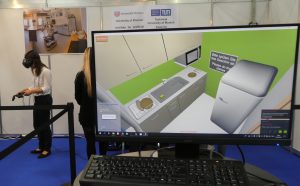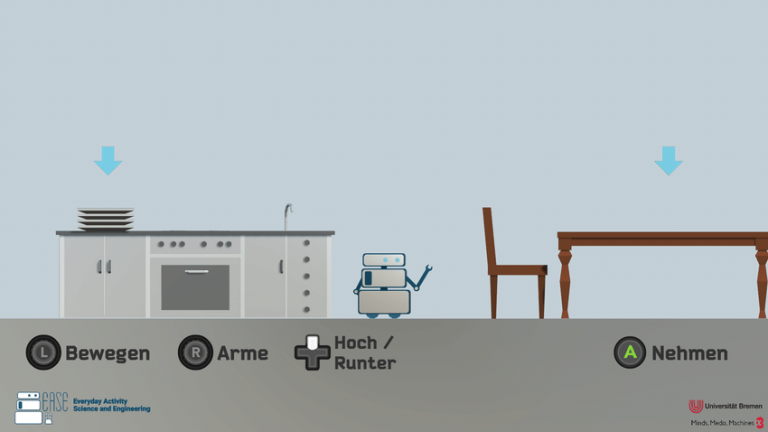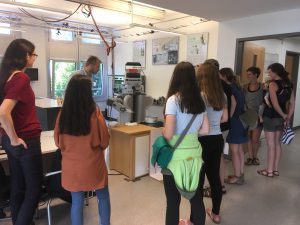One essential goal of EASE is to build an open research community and to democratize knowledge and technology. The project Citizen Science with EASE focuses on the prospective implications of cognitive robotics and helps to understand the digital transformation of our society. It also enables citizens to participate in shaping future developments.
EASE with its fairly realistic simulations of robots and human living environment based on game engine technologies has unique opportunities to engage with the general public. Based on the existing software infrastructure developed for open research, we can distill simplified versions of the simulation environments for integrating topics of Everyday Activity Science and Engineering into secondary education curricula and senior citizens in target group oriented citizen science projects.

RobCog - ROBot COmmonsense Games
Teaching robots through Games with a Purpose: The objective of RobCoG is to equip robots with commonsense and naive physics knowledge using games with a purpose. In the games users are asked to execute various tasks in different scenarios. The games are equipped with a semantic logging system which captures and stores symbolic and sub-symbolic data during the gameplay.

The Household Activities from Virtual Environments Data Set
It consist of 240 recordings in virtual reality, done at the Automatica Trade Fair 2018 in Munich. Recordings are split among the three household scenarios: "setting the table", "washing the dishes" and "cleaning the living room". The data set is of exploratory nature and each scenario name serves as the sole instruction the participants received (e.g. "please set the table"), in order to collect a wide variety of styles.
Paper by Karinne Ramirez-Amaro et al.: A Benchmarking Dataset for Automatic Symbolic Grounding from Virtual Demonstrations. 2nd International Workshop on Computational Models of Affordance in Robotics at the IEEE International Conference on Robotics and Automation (ICRA). 2019.

Learning with EASEY
The game Learning with EASEY was developed by EASE member Johannes Pfau and captured final constellations for limited tasks, Tool Feud actively recorded object preferences for generic, atomic everyday activity tasks and Elevator Empire added action sequences, as well as labels for useful or malicious behavior. It was part of the exhibition ”Einfach Wissenswert: Robotik und KI” in the Bremen ’Haus der Wissenschaft’ (February 15 – June 15, 2019).
Paper by Johannes Pfau and Rainer Malaka: Can You Rely On Human Computation? A Large-Scale Analysis of Disruptive Behavior In Games With A Purpose (PDF). CHI PLAY 2019, Barcelona, Spain.

smile Schülerlabor
EASE regularly opens its laboratory doors to school classes to encourage young students' interest in artificial intelligence and robotics and to provide an insight into scientific pratice. We also offer workshops in our facility during school holidays. Please contact us via ease[at]uni-bremen.de.
